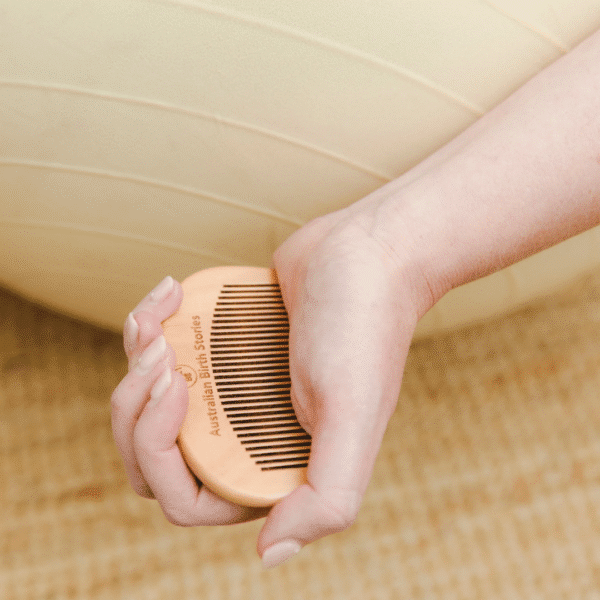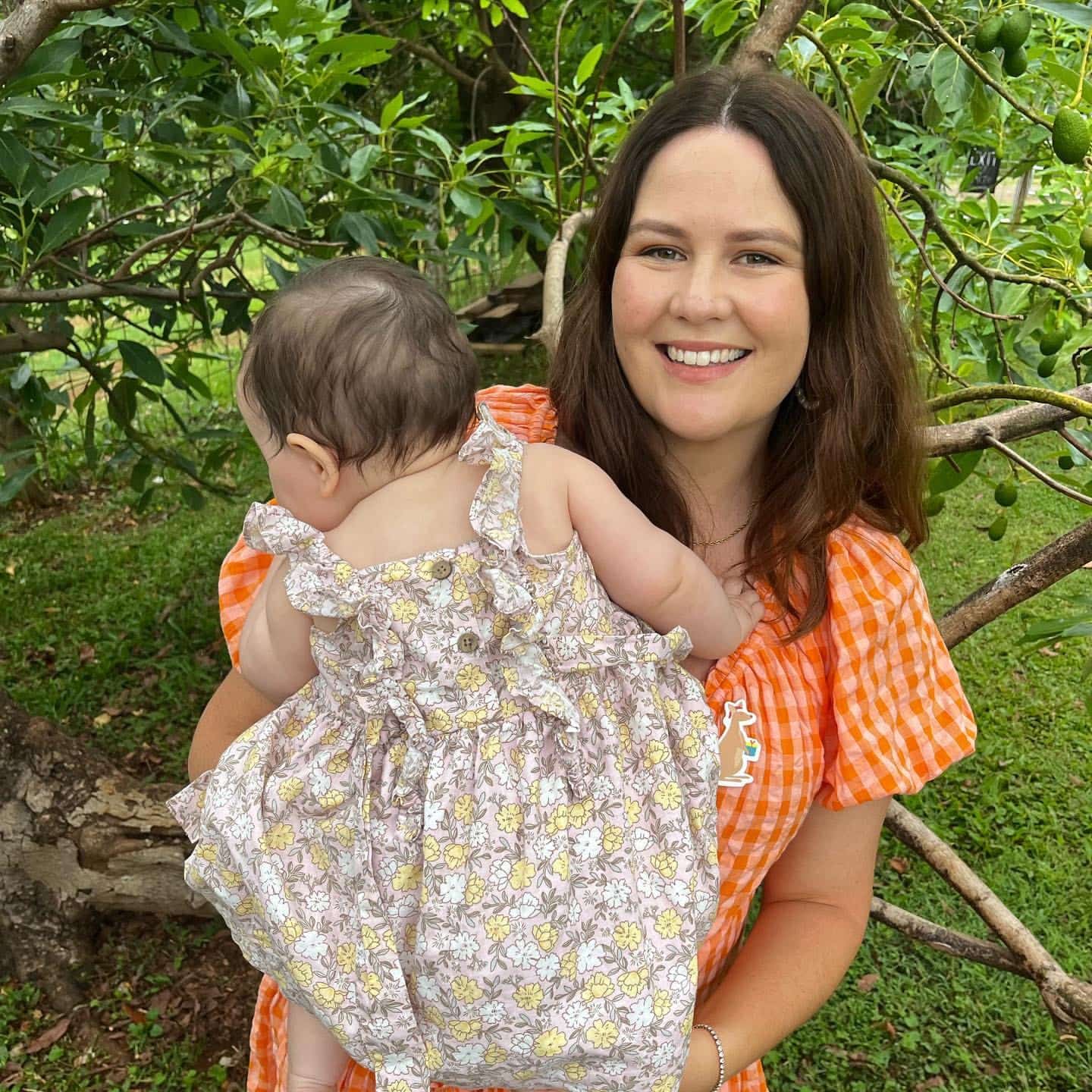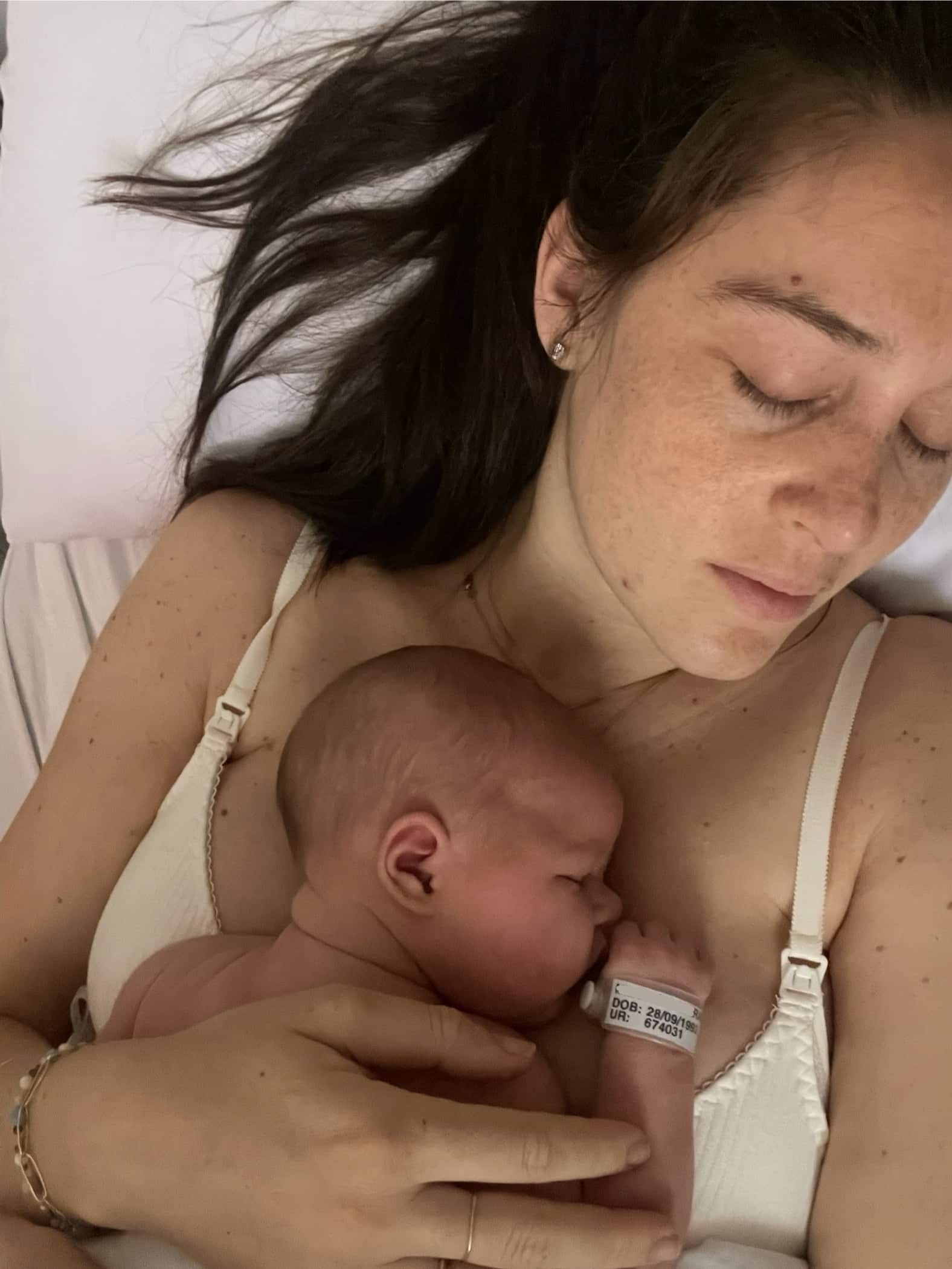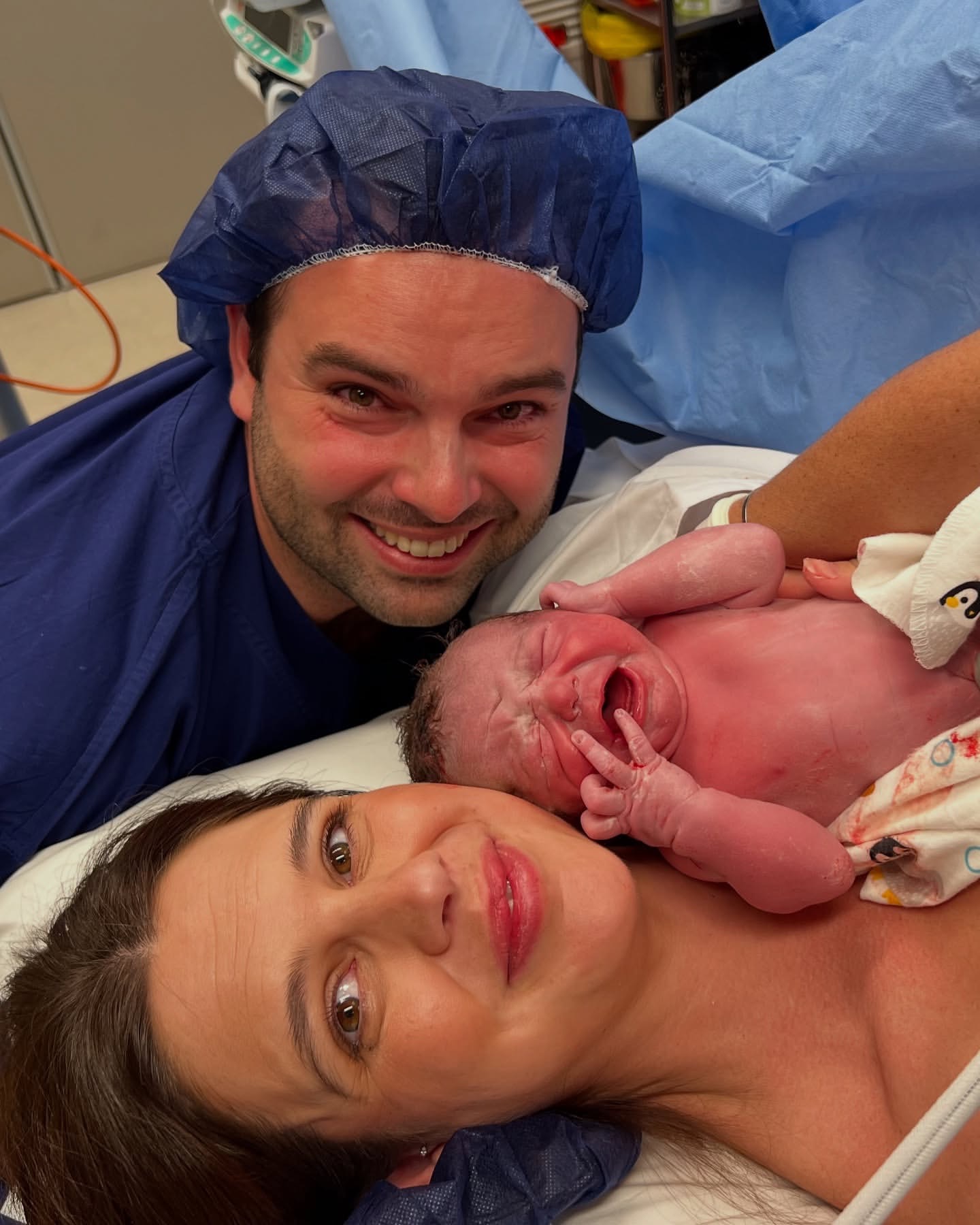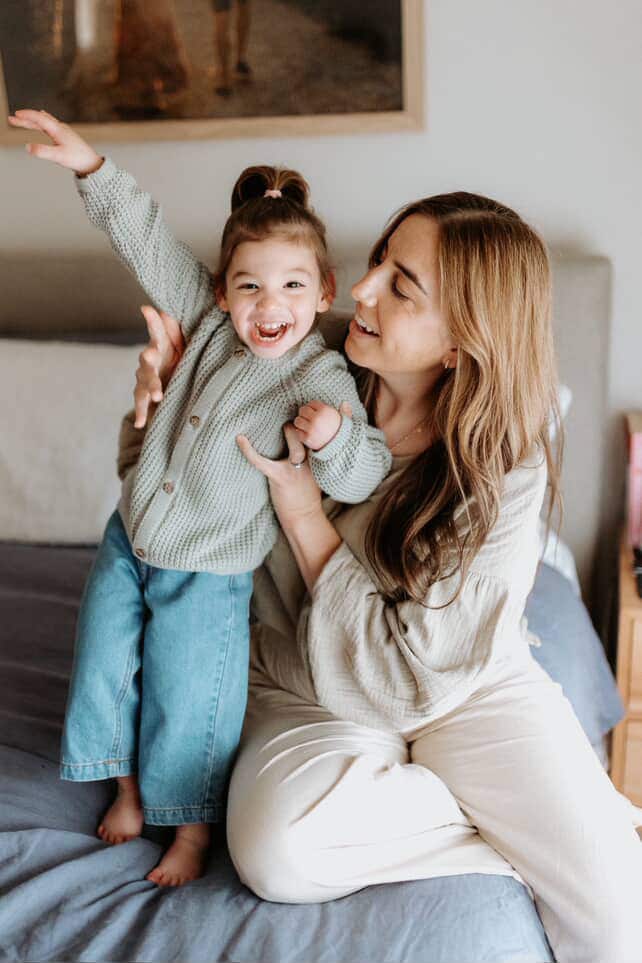Podcasts Kate + Dylan | Postpartum – parenthood and mental health support
EPISODE 412
Kate + Dylan | Postpartum – parenthood and mental health support
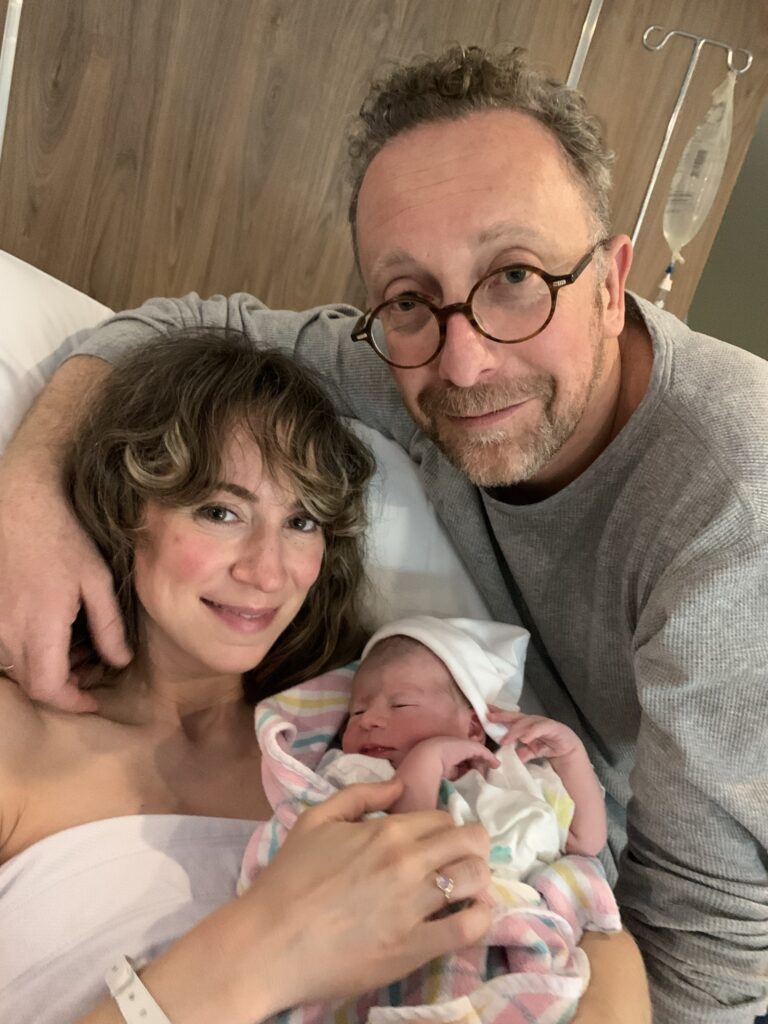
Kate : “My pregnancy was pretty smooth sailing about from the fatigue and the uncharacteristic bouts of rage. At 30 weeks a scan showed that my cervix was shortening so I was put on semi-bedrest and progesterone and I kept Marlow inside till 39+4. Being a health journalist I hear all the terrible, bad stories so I was very much doomsday prepping for anything that could go wrong and I felt like a shortened cervix was pretty light on the scale.
“In the end Marlowe was measuring a bit small so there was talk of an induction but when I got to hospital I was already 3cm dilated. They broke my waters and 45 minutes later, Marlowe was born. I went into complete shock; I expected it to be a really long labour and yet when they put the monitors on me they could see the contractions but I couldn’t feel a thing. I started to use the TENS machine and then I really started struggling, I couldn’t tell the difference between when one contraction ended and another began. The midwife told me I couldn’t have an epidural but I was fully dilated so I started pushing immediately. I had such a strong urge to push; my body was just doing it. Apparently all I could say for quite a while after birth was: hi baby!
“The staff were telling me that I’d have to camp outside the hospital for my next birth and I couldn’t believe they were saying that and I still hadn’t birthed the placenta. After the midwives left the room it was just the three of us. It was the first day of the Sydney lockdown and we knew we weren’t allowed to have visitors so we bunkered down for four days before being discharged.
“We were still in a bit of a bubble for a while. In the lead up to the birth there were some signs that Dylan wasn’t coping as well as he would usually with life stressors so we had plans in place to support us in postpartum. I’d never heard of night nurses or newborn care specialists but Dylan’s sister put us in touch with someone but I had a lot of trepidation about it, it’s not how I envisioned my postpartum. I imagined Dylan and I in the trenches together; in our home, the sleepless nights, figuring it out together, muddling through. I also thought I’d be in a very vulnerable state and I’m a very private person so the idea of having a stranger in the house was uncomfortable. In hindsight I don’t know how we would have made it through without the nurse. She came over the day we came home from hospital and she helped us set up the house, she helped us with feeding and night feeds …her support definitely delayed the onset of some of Dylan’s worst symptoms.
Dylan : “I was in an emotional, overjoyed period for a week or so. Within a day of coming home from hospital Kate got mastitis and on day 5 she was admitted to hospital. I was having to drive up to the hospital to get Kate’s expressed milk and then bring it home to feed Marlowe.
Kate : “When it’s your first baby, you don’t know what’s normal and what’s not. My milk had come in, I was engorged and really uncomfortable. On both breasts I got a really red rash, I couldn’t have anything touch them and my nipples were really damaged so they say that oral antibiotics wouldn’t cover it and I’d need IV antibiotics. There was no way I was going to bring my little newborn into the emergency department but I was a mess; I was hysterical. Mastitis is the devil; the fact that you still have to pump and feed your baby through it when all your body wants to do is power down. It was a baptism of fire for Dylan because he was having to drive to the hospital every three hours to get expressed milk and then he’d drive home to feed Marlowe.
Dylan : “I’ve had a generalised anxiety disorder for my entire adult life and I’ve managed it well but in consultation with my psychiatrist I decided to come off my medication. In hindsight, doing it during the pandemic and when I was about to have my first child probably wasn’t necessarily the best time. In late pregnancy I was starting to get anxious and then after the initial honeymoon period, the anxiety really kicked in. I remember holding him on the day he was born and I presume that every father recognises themself in their baby but it was more than that for me; I looked at Marlowe and it was like looking at a Benjamin Button version of me; I was looking at me as a baby and for whatever reason that really affected me…my psychiatrist referred to it as ‘ghosts in the nursery’ it dredges up issues to do with your own childhood, and concepts of being a kid, so essentially when I was caring for Marlowe, I was caring for myself as a child.
“Any stress that Marlowe felt was really hard for me. Over a couple of months my anxiety got worse and worse and there was depression mixed in with that as well. I found it really, really hard to be around Marlowe when he was upset and crying, I found it really hard to care for him and it got to the point where I was….I remember one morning, it was Halloween, and I was in the bedroom in our walk-in wardrobe, in a ball just weeping. The sound of Marlowe’s crying was so triggering and the emotional intensity was so intense I just tried to get away from it. I don’t know if I was suicidal but I was thinking about it a lot. Eventually, to Kate’s credit, she had talked to my sister and they decided that I needed help. Kate had spoken to a psychiatrist who was associated with St John of God in Sydney’s, a private psychiatrist hospital in the inner west and there was a vacancy in the psychiatrist ward. At first I hated the idea and I felt bereft that I’d got to this point that I needed to go to a psychiatrist hospital; it was unthinkable to me because that’s where crazy people go, and also it meant I was abandoning my wife and child. A big part of it was guilt; every minute I was feeling overwhelmingly guilty because Kate was doing all the work. I delayed it for a day or two but I eventually understood that it was the only option.
Kate : “It was really hard; it was a tug on my emotions and mental load that I’d never experienced before. Dylan is my favourite person in the entire world, I love him so deeply and to see him in so much pain was so hard. Yet I had Marlowe on my breast, I was settling him to sleep. Dylan would try so hard to be with us and to help but it caused him so much pain. He would be on the couch out of arm’s reach from me just crying and I couldn’t hug him because I was so busy with Marlowe. It broke my heart and I could see he was in a very dark and dangerous place. When I look back on photos from that time I can see the tension and the sorrow in Dylan’s face and body; he was just so worried about this little boy in the world and how he would be with a father like him. I knew Dylan had all the makings of a wonderful father but at that point Dylan couldn’t see it at all and he was getting so frustrated with himself. Luckily Dylan is very close to his family and they really rallied around us.
“The next big hurdle was trying to get him help and we started with outpatient psychiatrist appointments over zoom but I could see that we needed something more urgent. St John of God’s mother and baby unit came to mind because I had been speaking to the head psychiatrist there, Michelle Smith, and she said they wanted to call it a parent and baby unit because they knew Dad’s needed help too. Despite all the goodwill amongst the staff there, it took a lot to get Dylan in there. It was difficult because they’d never had a male patient in there and we had a lot of conversations about how we could make it work.
Dylan : Marlowe was four months old when I was admitted. With hindsight my anxiety in pregnancy was directly related to becoming a father. To be honest, just listening to Kate’s recollection it’s far better than mine. I was in survival mode, just getting through each day anyway I could. I felt empty and irretrievable.
Kate : We were really lucky that our obstetrician was all embracing of Dylan and his needs as well. The will is there, amongst perinatal health professionals, but it’s just so hard and I think it comes down to perception and stigma.
Dylan : I spent two or three days in the mood unit, and the wonderful psychiatrist there recognised that I needed to be in the mother and baby unit so she lobbied and got me in. They needed to speak to all the women who were currently in there to make sure they were okay with it. That was entirely understandable. It was a safe space for mothers and they needed to be comfortable with my presence but they all agreed. Marlowe was with me; after four, five months of being with Marlowe and doing it on her own, Kate was suddenly home alone and I had Marlowe with me. There’s no person in there that would go in without their baby because it’s about alleviating the issues you’re experiencing but it’s also about improving your bond with your baby. In the first week, the nurses care for the babies at night, the second week there’s a mix of on-off parenting and in the third week you care for the baby at night.
Kate : I think it’s very important to stress to people that they’re very welcoming of partners staying. Male and female partners were very welcome to stay. It was very important in Dylan’s circumstance under his psychiatrist, that he spent one on one time with Marlowe doing the hard yards without me. The decision was made for me to spend every other night with Dylan. Time has contracted for him because he was actually in the mood unit a lot longer than he remembers and we could all see that he was fine in there, it was very obvious that he needed the exposure to Marlowe in a controlled environment where he was supported.
“Not only were the mothercraft nurses were amazing and helped Dylan figure out his own ways of interacting with Marlowe, but there’s a real camaraderie amongst the patients and partners and for me the most powerful thing to see in terms of Dylan’s recovery was he could be surrounded by these mothers who were doing an amazing job of looking after their babies and he was thinking: these women are remarkable. I can be just as remarkable; we’re all in this place together, we’ve all had a really tough time but it doesn’t negate the fact that we’re trying to be amazing parents to our kids.
Dylan : They said to me at the beginning, you’re not going to change in three weeks; in regards to psychiatric medication and attachment …you’re not going to leave a perfect father but you’re going to start, that was the important thing. I saw a bit of hope and for anyone that’s had a difficult time in terms of mental illness, they’ll tell you that hope is incredibly important; it’s the absence of it that makes things very difficult.
“Being in there and meeting other people who are having a rough time and spending time with Marlowe in a supportive and supported environment, that really made a difference. I also felt a bit of guilt going in there because I’m meeting all these women…one woman was their with her third baby who had terrible reflux and would only sleep thirty minutes at a time…I felt guilt that I was taking a space that a woman could have had….but over time I was able to reconcile it because I was doing it for my family. It’s important not to diminish how I feel. It really emphasised to me what women go through; honestly as a man, you just don’t see the amount of headspace and hard work that mothering a newborn is.
Kate : “Not only were there empty rooms in there but there were a lot of things keeping women away from these units and a waitlist isn’t one of them. There were no out of pocket costs for us but I really believe that depression and anxiety in new dads is so underdiagnosed and they deal with it in really unhealthy ways. Dylan…the only reason why he was so badly affected is because he truly wanted to be an involved dad, to be there for me and marlow, and it was killing him that he couldn’t do that. Dads have a really tough time and ultimately they self-medicate with other vices whether that be going out at night, drinking more….
Dylan : It didn’t excuse the behaviour of some men but it helped me understand the old idea of the man throwing himself into his work, staying out late and essentially avoiding the child. If I was a new father in the 1950s I would have just thrown myself into work, stayed out drinking at night and frankly been a shit father, not developed the closeness to Marlow that I have now. Once a week they had a partners counselling session, for the men who were in there, and at least three of those partners at some point told me they wished they could get help, too. It really reinforced to me that men can also have a really rough time and it’s probably one of the only areas in health where we’re not paying attention to men.
“I stayed for three weeks and the week before discharge was scary. My mental health improved so quickly when I went in but it declined as departure approached. It was terrifying going home. Home had become really scary to me; walking through the front door prompted a sense of dread. I associated so much of my mental trauma with home for months after that.
Kate : “I was really optimistic but for the whole first year of Marlowe’s life I was on high alert, feeling as though the house of cards could fall in at any time. But I also saw the improvements in Dylan; he was still anxious but it was a much lower level, he was more engaged and had built a lovely connection with Marlowe and developed his own way of doing things.
Dylan : “With anxiety there’s this tendency to reach perfectionism; I felt like I was failing. I’d developed a lot of coping mechanisms that are avoidance….often the way you avoid things is by staying at home. But then this agent of chaos comes into your life and it’s in your home and you can’t avoid it. When I was in the unit a male nurse said to me: ‘If you’re getting it right 30% of the time you’re doing pretty well’. That really helped to remind me that being a parent is about embracing the chaos and accepting that things won’t work out sometimes and the baby will cry and it is what it is.
Kate : “Mental illness feels so ephemeral; as much as you think you’ve got things under control you’re always worried that it’s going to come back. When Lyra was born I was really hyper-focussed on how he was feeling. I was worried for Dylan but I also knew I could do it if Dylan did fall in a heap again which is something I desperately didn’t want to happen.
Dylan : “I’ve been really pleased with how I’ve felt and how I’ve dealt with it. This time around I haven’t felt like Im at the lowest ebb of my life. I feel closer to Lyra, I love my relationship with Marlowe and most important of all I’m able to help Kate. You see someone’s true character when they’re tending to someone they love and I can’t express how truly wonderful Kate was.”
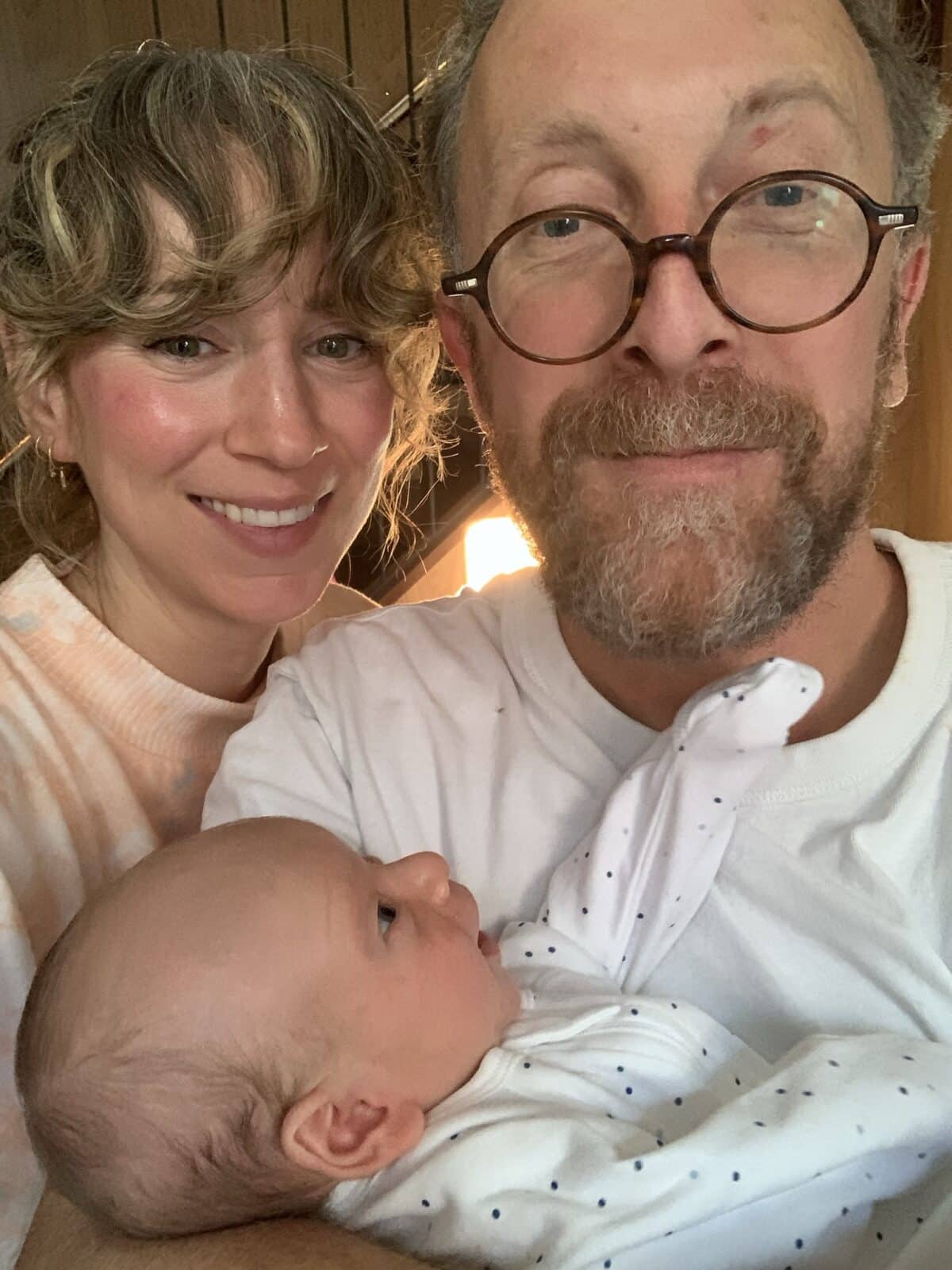
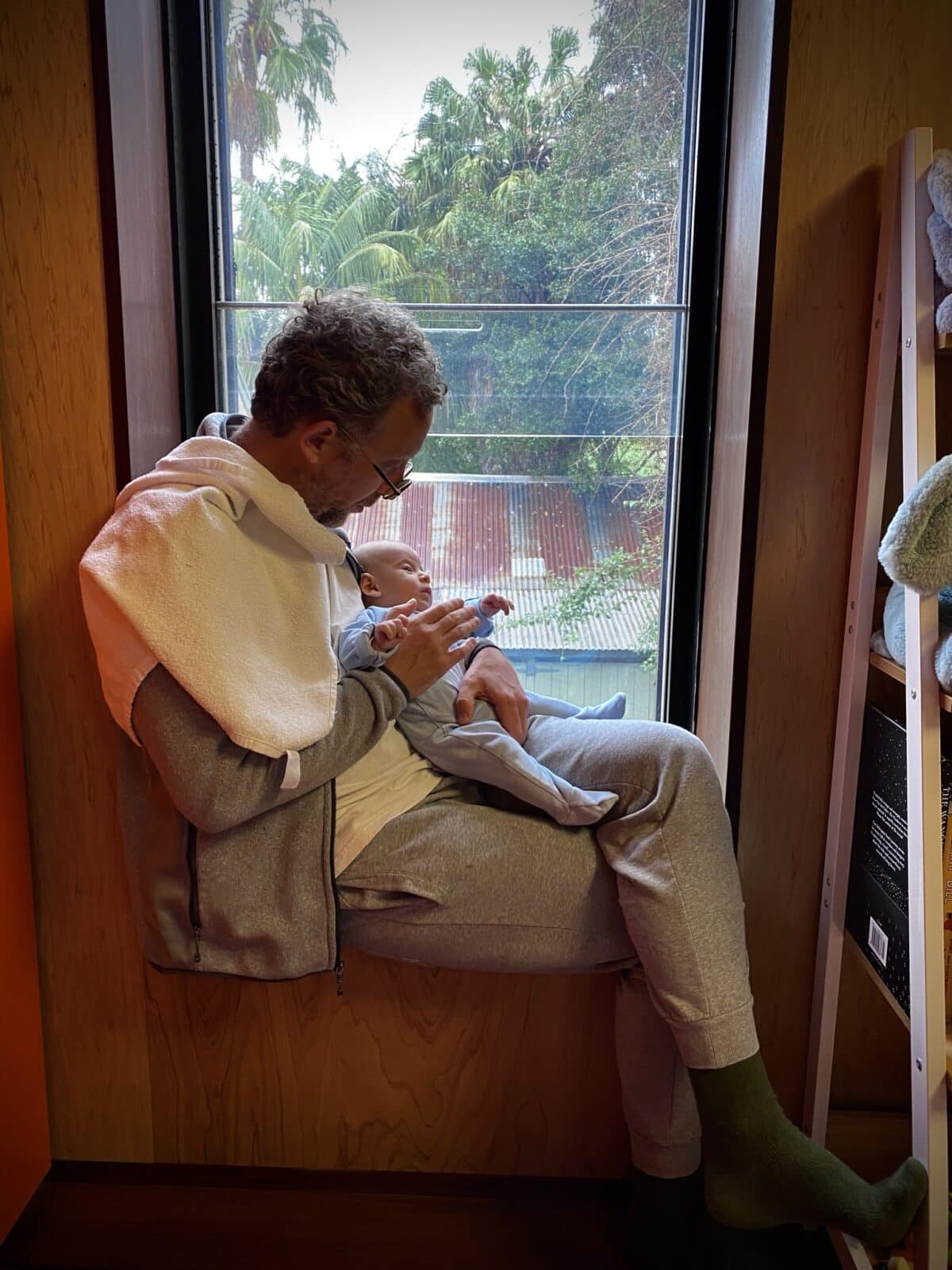
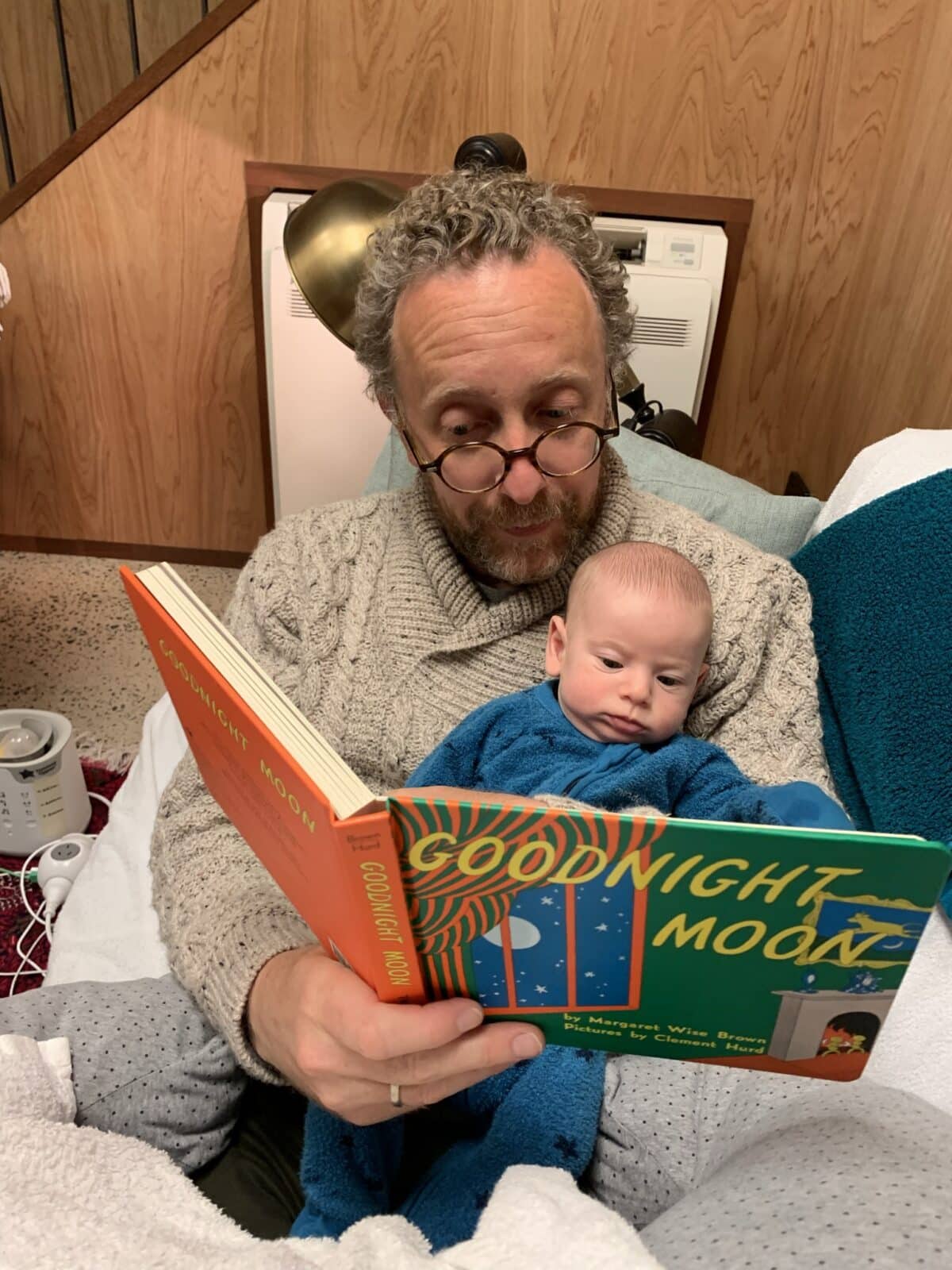
Topics Discussed
Mental health, Mental Health Support, Postpartum care, Postpartum support
Episode Sponsor
One Fine Baby is Australia’s favourite baby expo, and it’s coming to Melbourne this September on the 8th and 9th!
There’s over 150 boutique pregnancy, maternity, baby and toddler brands for you to try and buy from, expert advice and hands-on courses, beautiful facilities and plenty of entertainment for the little ones, One Fine Baby Expo has it all! Come and shop incredible EXPO-ONLY deals of up to 70% off a huge range of brands. There’s everything from prams, furniture, feeding, clothing, baby carriers, bedding, and so much more.
Categories
Related Products
-
Birth Combs: Harness Your Body’s Natural Pain Relief
$24.95Crafted from smooth, natural wood, our birth combs activate specific pressure points in your hands that trigger your body’s innate pain-relieving responses.
Join the conversation
Sign up to get the latest updates, freebies, podcast releases straight into your inbox
@AustralianBirthStories
Follow along with us
@AustralianBirthStories
Follow along with us
@AustralianBirthStories
Follow along with us
@AustralianBirthStories
Follow along with us
@AustralianBirthStories
Follow along with us
@AustralianBirthStories
Follow along with us
@AustralianBirthStories
Follow along with us
@AustralianBirthStories
Follow along with us
@AustralianBirthStories
Follow along with us
@AustralianBirthStories
Follow along with us
@AustralianBirthStories
Follow along with us
@AustralianBirthStories
Follow along with us
